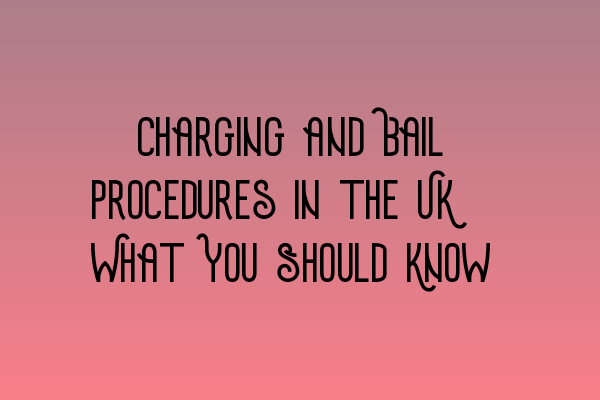Charging and Bail Procedures in the UK: What You Should Know
When it comes to criminal law, understanding the charging and bail procedures in the UK is crucial. Whether you are a defendant, a victim, or someone involved in the justice system, having a clear understanding of these processes ensures transparency, fairness, and the proper functioning of our legal system.
The Charging Process
The charging process is the first step in a criminal case. It is the formal accusation of committing a crime. Police officers and prosecutors play significant roles in this stage. Once the police have gathered sufficient evidence, they will submit their findings to the Crown Prosecution Service (CPS), who will then decide whether there is enough evidence to charge the suspect.
The CPS conducts a thorough review of the evidence provided by the police. They assess the strength of the evidence, decide what charges are appropriate, and determine whether a prosecution is in the public interest. It is important to note that the CPS operates independently to ensure fairness and impartiality in the charging decision.
Once the CPS determines that there is sufficient evidence, they will formally charge the suspect. The suspect will then receive a charge sheet outlining the specific offenses they are accused of committing. It is at this point that the defendant becomes a criminal suspect and the case moves forward.
If you want to learn more about criminal law procedures and prepare for your SQE exams, check out our article on SQE 1 Practice Exam Questions.
The Bail Process
After being charged with a criminal offense, a suspect will often be taken into custody. However, not everyone remains in custody throughout the trial process. The bail process determines whether a defendant should be released from custody before their trial or be held until their trial date.
During a bail hearing, the court considers several factors such as the seriousness of the offense, the defendant’s ties to the community, their criminal history, and the likelihood of them fleeing or tampering with evidence. The court’s primary consideration is public safety and ensuring the defendant’s appearance at trial.
If the court grants bail, the defendant may be released under certain conditions, such as reporting to a police station regularly or surrendering their passport. Failure to comply with these conditions can result in the revocation of bail and the defendant being returned to custody.
If you are preparing for your SQE exams, our SQE 2 Preparation Courses can provide you with comprehensive knowledge of criminal law, including charging and bail procedures.
It is important to note that the bail process can vary depending on the severity of the offense and the individual circumstances of the case. Some cases, such as those involving serious violent crimes or if there is a high risk of flight, may result in the denial of bail altogether.
To stay up to date with the latest SRA SQE Exam Dates and other important information, make sure to check our article on SRA SQE Exam Dates.
Overall, the charging and bail procedures in the UK are essential elements of the criminal justice system. They ensure that individuals are held accountable for their actions while safeguarding their rights to a fair trial and due process. Understanding these procedures is vital for anyone involved in criminal law, from legal professionals to those preparing for their SQE exams.
For more guidance and resources on criminal law procedures, take a look at our article on SQE 1 Practice Mocks FLK1 FLK2.
